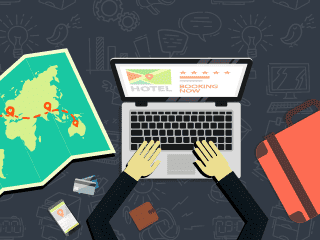Note: This is the first in a series of posts on how independent properties can compete with OTAs. Read the other posts.
As an innkeeper or hotel marketer, you know that getting your property in front of potential customers at the right time is key to driving direct bookings. But unfortunately, many bed and breakfasts, inns, and small hotels don’t know how to compete with the 800-pound gorillas in the room: meta search engines and Online Travel Agencies (OTAs).
I often ask myself if there are any properties that actually like the OTAs. So many of our customers and the properties I speak with have a very strained relationship with them. On one hand, they like the extra exposure, but on the other, they are upset about paying high commissions for those reservations.
Consider this: Let’s say you have a hotel with 40 rooms, and you average a healthy 80% occupancy. Your ADR is $175 per night. You use the OTAs, but you don’t discount your rate. And let’s say that 42% of your bookings come from the OTAs, and they charge you 25%.
Under that scenario, your hotel would be losing almost $270,000 per year alone!
Unfortunately, I don’t think it’s reasonable to completely exclude doing business with the OTAs. They have massive marketing budgets and they do provide useful tools for your potential guests. However, I think innkeepers and general managers need to start thinking of OTAs as a marketing channel—one that can be turned on and off, and used only when necessary.
So what’s the secret to taking back some of those bookings? Hard work and discipline. Competing with the OTAs is difficult.
This post is the first of four in which I’ll cover tactics and strategies to help your property be less reliant on the OTAs.
#1 Leverage Local Search
So what the heck is local search?
Above is an example of a typical hospitality search engine results page. At the top of the page and in the right-hand column you will notice a bunch of paid listings. At the bottom of the page you’ll see organic (or natural) search results. The pink box outlines Google’s “local pack,” or local 3-pack. This is primarily driven by Google’s My Business service.
In my opinion, Google My Business is the most important tool to help new and existing customers find your property online. Google created this service specifically to help local businesses, including inns and bed and breakfasts, get found through desktop and mobile searches.
Speaking of mobile, here’s an interesting stat for you: According to Google, there are now more searches conducted on mobile devices than desktops worldwide. Local search is a huge component of the mobile search algorithm.
So we know local search is important. Here are 3 rapid-fire tips to leverage local search:
- Go to your Google My Business page and determine if your property is listed already. If it’s not, then create a listing. If it is, claim your listing.
- Optimize your my business page by filling out your listing. Take special care to to ensure that your name, address, and phone number (NAP) are accurate and match how they appear on your own website. If you have other business listings, like Yellow Pages or Yelp, try to make sure all of them are the same. Select the appropriate category, and add photos and a unique description.
- Finally, ask guests to review your property! The reviews factor into your ranking, plus, the stars are displayed in the Local Pack results.
Ready for the next tip? Get it here.




